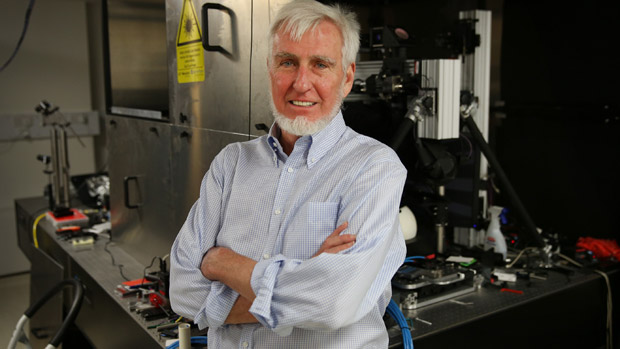UK immigration rules too strict, says Nobel prize winner
Britain must loosen its immigration policy if it wants to 'punch above its weight' in science, says John O'Keefe

A free daily email with the biggest news stories of the day – and the best features from TheWeek.com
You are now subscribed
Your newsletter sign-up was successful
Nobel Prize winner John O'Keefe warned that Britain's restrictive attitude to immigration could damage its ability to attract top scientific talent into the country.
O'Keefe, who has dual British and American citizenship, was part of a three-person team awarded the Nobel prize for medicine yesterday for their discovery that a part of the brain acts as an internal GPS system, helping us to navigate.
Professor O'Keefe said that Britain's immigration policy was "a very, very large obstacle" to Britain attracting the best young scientists hoping to live and work in the UK, and could stand in the way of important research.
The Week
Escape your echo chamber. Get the facts behind the news, plus analysis from multiple perspectives.

Sign up for The Week's Free Newsletters
From our morning news briefing to a weekly Good News Newsletter, get the best of The Week delivered directly to your inbox.
From our morning news briefing to a weekly Good News Newsletter, get the best of The Week delivered directly to your inbox.
O'Keefe moved to University College London after beginning his career in Canada.
As part of his new role as the head of the Sainsbury Wellcome Centre, a new research centre for work on neural circuits and behaviour at the university, O'Keefe will have to recruit 150 neuroscientists, and he says he expects immigration rules to be a "large obstacle" in that task.
"I am very, very acutely aware of what you have to do if you want to bring people into Britain and to get through immigration," O'Keefe said. "I'm not saying it's impossible, but we should be thinking hard about making Britain a more welcoming place."
David Cameron has set a target of reducing net migration to less than 100,000 by 2015, while Home Secretary Theresa May has spoken about bringing it to tens of thousands, the BBC reports.
A free daily email with the biggest news stories of the day – and the best features from TheWeek.com
O'Keefe said science must be allowed to continue its work unhindered by national borders. "Science is international, the best scientists can come from anywhere, they can come from next door or they can come from a small village in a country anywhere in the world, we need to make it easier," he said.
"Britain punches way above its weight in science and I think we need to continue to do that and anything that makes it easier to bring scientists in will be very welcome."
-
 Political cartoons for February 16
Political cartoons for February 16Cartoons Monday’s political cartoons include President's Day, a valentine from the Epstein files, and more
-
 Regent Hong Kong: a tranquil haven with a prime waterfront spot
Regent Hong Kong: a tranquil haven with a prime waterfront spotThe Week Recommends The trendy hotel recently underwent an extensive two-year revamp
-
 The problem with diagnosing profound autism
The problem with diagnosing profound autismThe Explainer Experts are reconsidering the idea of autism as a spectrum, which could impact diagnoses and policy making for the condition
-
 How corrupt is the UK?
How corrupt is the UK?The Explainer Decline in standards ‘risks becoming a defining feature of our political culture’ as Britain falls to lowest ever score on global index
-
 The high street: Britain’s next political battleground?
The high street: Britain’s next political battleground?In the Spotlight Mass closure of shops and influx of organised crime are fuelling voter anger, and offer an opening for Reform UK
-
 Is a Reform-Tory pact becoming more likely?
Is a Reform-Tory pact becoming more likely?Today’s Big Question Nigel Farage’s party is ahead in the polls but still falls well short of a Commons majority, while Conservatives are still losing MPs to Reform
-
 Taking the low road: why the SNP is still standing strong
Taking the low road: why the SNP is still standing strongTalking Point Party is on track for a fifth consecutive victory in May’s Holyrood election, despite controversies and plummeting support
-
 What difference will the 'historic' UK-Germany treaty make?
What difference will the 'historic' UK-Germany treaty make?Today's Big Question Europe's two biggest economies sign first treaty since WWII, underscoring 'triangle alliance' with France amid growing Russian threat and US distance
-
 Is the G7 still relevant?
Is the G7 still relevant?Talking Point Donald Trump's early departure cast a shadow over this week's meeting of the world's major democracies
-
 Angela Rayner: Labour's next leader?
Angela Rayner: Labour's next leader?Today's Big Question A leaked memo has sparked speculation that the deputy PM is positioning herself as the left-of-centre alternative to Keir Starmer
-
 Is Starmer's plan to send migrants overseas Rwanda 2.0?
Is Starmer's plan to send migrants overseas Rwanda 2.0?Today's Big Question Failed asylum seekers could be removed to Balkan nations under new government plans